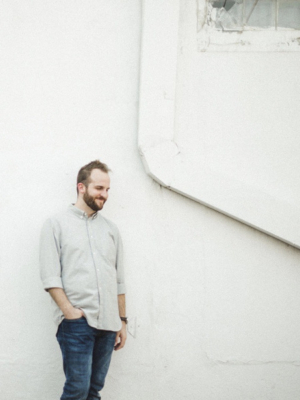A Little Voice That Never Quits
 I’m crying in the principal’s office, but I’m an adult.
I’m crying in the principal’s office, but I’m an adult.
I’ve just quit my job at the school where I started my teaching career, and I’m telling my boss why. No, I don’t have a job lined up. No, it’s not because of any negative experience: I love this campus and the community I’ve made here since 2013. I just… need to go.
There’s a little voice inside my head that says I’m making a huge mistake. A little voice that says there’s no other job out there for me. A little voice that says it’s my depression, not the job, that is making me feel this way.
The little voice won’t go away.
***
I started teaching eight years ago. All through my undergraduate studies, I planned to be a minister. I worked with several youth groups throughout college, and I loved fostering relationships with kids who were working to figure out who they were. But something never felt right. I grew up in a conservative Christian tradition, and throughout college I had learned new perspectives on religion that changed my mind. I believed that women should have access to the same roles as men. I opposed my denomination’s official stance on LGBTQ+ rights. I also felt it was our responsibility to engage politically with the world, and beyond, rather than ignoring the social issues that surrounded us. It was clear I needed to find something else, something that fit who I was becoming. I couldn’t hide my beliefs from the teenagers I worked with when they asked. I couldn’t tell the truth without risking my job, but I needed to be authentic to myself.
As my college graduation approached, I started looking into alternate paths. Teach For America had reached out to me in their recruitment efforts at my university. Since I had been working with teenagers throughout college, they encouraged me to consider becoming a teacher. I loved studying a subject deeply and imparting both my knowledge and curiosity about it, hearing the perspectives of young people as we sought some kind of truth. I was placed in a middle school role, where I quickly found that teaching filled the void ministry once did. I could work with students as I had in ministry and still have discussions about the deeper meanings behind texts. Only now, it would be from a wider breadth of literature than the Bible. I could explore multiple perspectives and ambiguity within texts rather than giving singular, church-approved messages. I felt that education was exactly the field I belonged in.
Over the years, a part of me had always wanted to learn how to be a campus leader outside of the classroom, to influence a school system from the administrative side. I wanted to challenge myself beyond teaching and address some of the issues I perceived in education from a different angle. Last year, this desire, along with a warning sign, finally materialized. In July 2020, Texas sent all teachers and many students back to campus despite an ongoing pandemic that put the health and safety of millions of Texans at risk. I wanted a job in an office where I could remain relatively solitary and safe while still being an integral part of my campus. The time to jump from the classroom had arrived.
In this new role, I was mostly alone in an office, organizing testing materials, ensuring I carried out the legal requirements set by the state, and training staff members who were already worn out from more than a year of teaching in a pandemic. Part of my job involved working with students on their dual credit requirements, but I felt peripheral to their day-to-day lives and needs.
I had traded the stress of teaching with a relatively mundane experience, but I didn’t enjoy it. I’ve always had issues with the systemic inequities embedded within standardized testing, and I didn’t gain a heart for it in the last year. I rose to the task and performed my job well, but it took a mental toll on me. Spending all of my time on testing only made me resent it more. My passion is and has always been in working with students, and this aspect of a school system only partially included communicating with them.
I felt the inkling of a feeling, that I had erred in leaving the classroom. Over the course of the year, that feeling only rose. As the school year came to a close, I worried that I had taken a wrong turn down a path, that it was too late to turn back or choose a different direction. At least, that’s what the little voice told me.
***
 When the school year ended, I convinced myself I could do it for one more year. What’s one more year in a person’s life? Plus, I hate applying for jobs. I don’t know anyone who loves it, but it’s difficult to sit at a computer and write various cover letters for different roles, learning complicated and overly confusing systems for entering your employment history. It’s 2021 and we still haven’t streamlined application processes.
When the school year ended, I convinced myself I could do it for one more year. What’s one more year in a person’s life? Plus, I hate applying for jobs. I don’t know anyone who loves it, but it’s difficult to sit at a computer and write various cover letters for different roles, learning complicated and overly confusing systems for entering your employment history. It’s 2021 and we still haven’t streamlined application processes.
So: one more year. I could do it.
Then, halfway through the summer, my sister tipped me to a job I might be interested in. I applied for it, and in the process of interviewing, I realized something: One more year was an entire year. Did I really want to spend another year of my life doing something I didn’t enjoy? After a year of a pandemic with no end in sight, I was becoming more and more aware of how precious our time on Earth really is. I loved the people I worked with, but I knew this role didn’t fit me either.
Like ministry, my heart was no longer in the work. I wasn’t being true to myself.
In the midst of acknowledging I was doing a job that didn’t align with my values, I realized that I had to quit. It didn’t matter if I didn’t get the job I was interviewing for. I simply had to do something else. This is what I told my boss, and she supported me. She encouraged me to go out into the world and try something else. She embraced me, and she called me family. This was the type of support I wasn’t expecting, and it made it even harder to leave.
There was a little voice inside my head that told me this was proof I was wrong. A little voice that said to take it back, to say, “Just kidding!” A little voice telling me to ignore that I was miserable for the sake of being comfortable.
In the midst of me quitting, the little voice said it never would.
***
Weeks after my conversation with my boss, I didn’t get the role I was applying for. I was now home alone, watching as the people I live with went to work.
That’s when the panic set in. What had I done? I quit a job without another one lined up, and now I had no prospects. Frantically, I started applying for jobs, worrying that money would run out. My partner is currently a law student, and we rely solely on my income. I quit with the knowledge that we had enough while I searched and interviewed, but I felt I had truly set us up for disaster in the months to come.
As I felt the quiet of the house surround me, the little voice came back to tell me I had squandered my potential. The little voice told me I had wasted the last eight years of my life only to be without the only job I’d ever have. The little voice told me that I would never recover from this, that I was worthless, and my unemployment—however voluntary—was evidence of my failure. When I think of people reading this, that little voice multiplies into a chorus.
It’s the voice that says I’ve had a privileged life, that I let go of a solid career while others struggle to find work. While it’s true that my socioeconomic background and life circumstances led me to my current place, it doesn’t cover over the depression I’ve been working through in the past few years. It’s all happening at once, and I have to hold both truths in their complexities.
Even so, as I apply for jobs and wait forever to hear back, that little voice gnaws at me, telling me that I’m undeserving, that I’m not good enough, that nothing will work out. It drains my energy, and I sometimes end up unable to do anything for the rest of the day except nap and zone out on some screen. It’s been a month since my last day at my old job, and I looked forward to some free time where I could write and catch up on books I’ve been meaning to read. But I’ve hardly written a word (these have been a mountain to climb) and my unread piles remain. It’s hard to enjoy the things you love when depression hangs over the days like a cloud always about to rain.
But I try to practice what I have been learning in counseling this year, to disrupt the negative thought patterns with mantras I know to be true:
I am proud of myself for taking a step toward improved mental health.
I have done good work in education for eight years and will find a role where I can bring my experience and abilities to the table.
I have value apart from work and no job I get or miss out on can tell me what I’m worth to the people who love me.
It’s often difficult to repeat these phrases, but it’s necessary to interrupt the other thoughts vying for—and often dominating—my attention.
There’s a little voice that never quits, but I’m learning to hone another one, a voice that gains a bit more momentum every day. It’s a voice that’s teaching me to love myself, to be gentle with the one life I have, and it’s starting to work.
Ben Lewellyn-Taylor lives in Dallas, TX. He is an MFA student at Antioch University and the Blog Director for Lunch Ticket. His work appears in The Adroit Journal, Colorado Review, The Drift, Heavy Feather Review, New South Journal, New Critique, No Contact Mag, Oyez Review, Porter House Review, Postscript Magazine, and others, all of which can be found at benlewellyntaylor.com.





